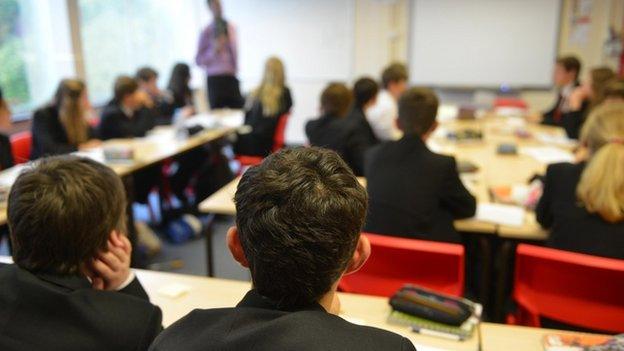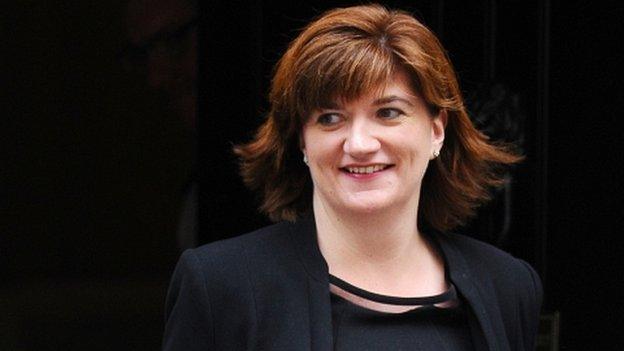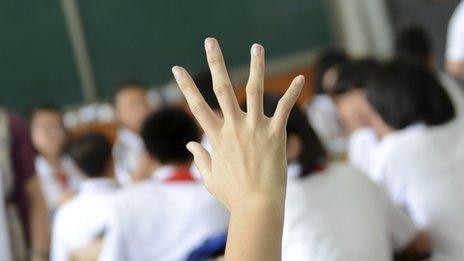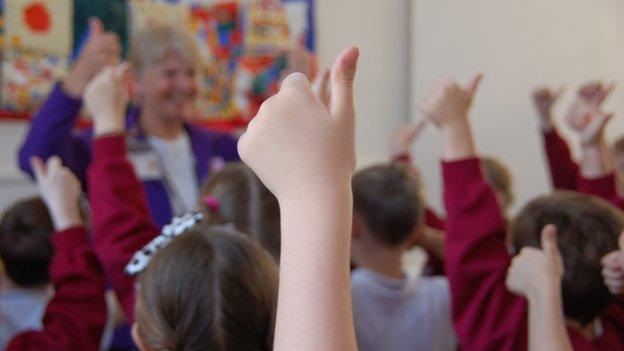Compulsory PSHE 'not ruled out'
- Published

MPs had warned there was a lack of clarity about the status of PSHE lessons
The education secretary has not backed MPs' calls to make PSHE - personal, social, health and economic education - compulsory in state schools in England.
But a senior adviser has suggested that the door was being left open for a future review of its status.
The chairman of the Education Select Committee, which had called for the subject to be compulsory, had accused ministers of a "feeble" response.
Neil Carmichael said ministers had "brushed over" MPs' proposals.
Education Secretary Nicky Morgan said PSHE lessons were important but "not yet good enough in many schools".
The select committee had called for a message from ministers that the subject would be made compulsory.
The education secretary said: "In the coming months I intend to look at all the options to ensure PSHE is taught well everywhere."
The subject teaches a wide range of topics related to keeping pupils safe and healthy, including issues such as:
sex and relationships
drugs
healthy eating
bullying
citizenship
It is taught by most state schools, but it is not compulsory.

Nicky Morgan says the quality of many PSHE lessons needs to improve
The House of Commons Education Select Committee, in a report published before the general election, had warned of a "lack of clarity on the status of the subject".
"This must change, and we accept the argument that statutory status is needed for PSHE, with sex and relationships education as a core part of it," it said.
The committee had said that the quality of lessons in the subject required improvement in 40% of schools - and that young people too often reported that the "sex and relationships education they receive is inadequate".
"This situation would not be tolerated in other subjects," said the committee's report.
The education secretary's response emphasised the need to improve the standards of PSHE lessons, but did not indicate any decision to change its status.
Mrs Morgan said PSHE and sex and relationships education were "essential to keeping pupils safe and healthy, inside and outside the school gates".
"Young people today face unprecedented pressures posed by modern technology," she said.
"Good quality PSHE can provide them with the information they need to stay safe and build resilience against the risks of exploitation or radicalisation.
"At its heart, good PSHE supports young people to make informed choices."
Education Select Committee chairman Mr Carmichael said the response was "disappointing".
"Ministers entirely sidestep the call made by MPs in the closing months of the last Parliament to give statutory status to PSHE," he said.
"It is unclear why it should have taken the government so long to publish such a feeble response.
"The inquiry found the government's strategy for improving PSHE and sex and relationships education in schools to be weak.
"Yet there is nothing in this response to reassure Parliament - or young people - that the situation will now improve."
But the Family Education Trust has spoken out against the idea of PSHE being made compulsory, arguing it would weaken the sense of parents having prime responsibility for keeping their children safe and healthy.
"The more that schools take responsibility to themselves for these areas, the less that parents will see them as their responsibility," said director Norman Wells.
Anna Feuchtwang, chief executive at the National Children's Bureau, said: 'We welcome the government's commitment to improve the quality of PSHE and sex and relationships education (SRE) in our schools but urge ministers to go further and make PSHE a compulsory part of the curriculum for all pupils."
- Published15 July 2015

- Published17 February 2015
